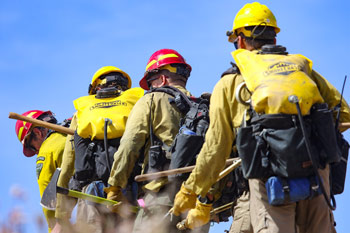Click Here for California Fires
September 1, 2024 - More than 14,400 wildland firefighters and support personnel are assigned to wildfires in 10 states. As we head into September, 43 large active wildfires are being  managed with full suppression strategies across the United States. Current wildfires have burned 1,739,846 acres. Right now, resources assigned to incidents include 17 complex and one Type 1 incident management teams, 304 crews, 619 engines, and 86 helicopters. Residents near seven large fires remain under evacuation orders on seven incidents. If you or your family have been evacuated, please continue to follow the evacuation orders and guidance of law enforcement officials.
managed with full suppression strategies across the United States. Current wildfires have burned 1,739,846 acres. Right now, resources assigned to incidents include 17 complex and one Type 1 incident management teams, 304 crews, 619 engines, and 86 helicopters. Residents near seven large fires remain under evacuation orders on seven incidents. If you or your family have been evacuated, please continue to follow the evacuation orders and guidance of law enforcement officials.
Late summer and fall are characterized by extremely dry fuels in many parts of the country, and multiple geographic areas continue to fight fires that threaten homes and present major challenges to containment. Even if temperatures are coming down in your area, maintain heightened awareness of any possible sources of ignition.
Remember to always check for local fire restrictions before starting any outdoor activity. If fire restrictions are in place, respect them. By staying vigilant and making responsible choices, we can all help protect our communities and preserve our beautiful landscapes from devastating wildfires. Remember, it takes all of us to prevent wildfires.
Sixty fireline management personnel from Australia and New Zealand are assigned to support large fires in the Northwest Area. For more information about the mobilization of wildland firefighters from Australia and New Zealand visit the international support page.
Two hundred forty-five soldiers from the 14th Brigade Engineer Battalion and the 1st Battalion, 17th Infantry Regiment based out of Joint Base Lewis McChord (JBLM) are deployed in support of wildland fire operations on the Boise National Forest. NIMO (Team 2) is assigned to support the military contingent. To learn more about military mobilizations, visit the military support page.
Note: Given the very high tempo and scale of national fire activity over the past few months, there have been delays in reconciling actual acreage burned with entries into the reporting systems, especially from areas with large fires and dynamic fire activity. Adjustments are occurring as the accuracy of fire locations, mapping and final fire reporting is reconciled.
Another day of hot temperatures and very low relative humidity of 4-20% is forecast across California into the northern two-thirds of the Intermountain West. However, some cooling is forecast west of the Cascades, with higher humidity. Locally breezy westerly winds of 15-20 mph gusting to 30 mph are likely along the Sierra Front and through the Cascade Gaps. Dry and breezy south to southeasterly winds will develop amid above normal temperatures on the northern and central High Plains, with the strongest winds likely in eastern Wyoming into southeast Montana. Isolated, mainly dry, thunderstorms are forecast to develop across much of central and eastern Nevada into southern Utah and the West Slope, with isolated to scattered mainly wet thunderstorms in Arizona. Isolated dry thunderstorms are likely to develop in south-central Oregon as well. Overnight, isolated dry thunderstorms will develop across northern Nevada into central and southeast Oregon and southwest Idaho. Isolated dry thunderstorms may also develop overnight near and west of the Oregon Cascades, but confidence is low. A weakening cold front will move into the South, with isolated to scattered wet thunderstorms and cooler temperatures. Heavy rain is also likely to continue in far southeast Texas and southern Louisiana due to low pressure in the northwestern Gulf of Mexico
| Number of new large fires or emergency response * New fires are identified with an asterisk |
3 | States currently reporting large fires: |
| Total number of active large fires Total does not include individual fires within complexes. |
43 | |
| Acres from active fires | 1,739,846 | |
| Fires contained | 0 |
Year-to-date statistics
| 2024 (1/1/24-9/01/24) | Fires: 33,735 | Acres: 6,418,477 |
| 2023 (1/1/23-9/01/23) | Fires: 39,703 | Acres: 2,074,578 |
| 2022 (1/1/22-9/01/22) | Fires: 42,844 | Acres: 6,172,464 |
| 2021 (1/1/21-9/01/21) | Fires: 43,017 | Acres: 4,946,000 |
| 2020 (1/1/20-9/01/20) | Fires: 40,161 | Acres: 4,063,267 |
| 2019 (1/1/19-9/01/19) | Fires: 33,680 | Acres: 4,071,070 |
| 2018 (1/1/18-9/01/18) | Fires: 45,579 | Acres: 6,939,284 |
| 2017 (1/1/17-9/01/17) | Fires: 46,648 | Acres: 7,378,212 |
| 2016 (1/1/16-9/01/16) | Fires: 40,630 | Acres: 4,623,046 |
| 2015 (1/1/15-9/01/15) | Fires: 43,931 | Acres: 8,397,886 |
| 2014 (1/1/14-9/01/14) | Fires: 38,647 | Acres: 2,753,089 |
| 2014-2023 | Fires: 41,704 | Acres: 5,066,024 |
Source: NIFC








